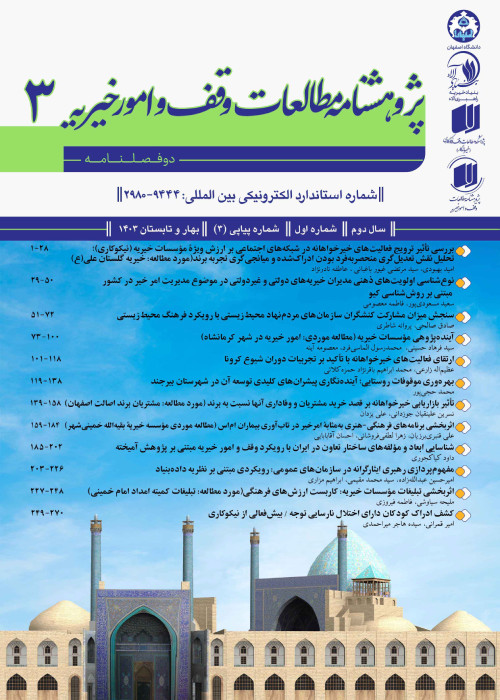Future Study of Charitable Institutions (Case Study: Charity Affairs in Kermanshah City)
Knowing and being aware of the future is a dream that has focused many people's efforts since long ago. In this regard, the use of the science of future study is a set of efforts that use the analysis of sources, patterns, and factors of change or stability, envisioning potential futures and planning for them (Eskandarinezhad et al., 2023; Szabo, 2014). The need for future study and knowledge of the future in all fields, including good affairs, is of great importance. Today, due to the decrease in donations and the number of volunteers, the future of charitable institutions at the local level is unfavorable (Zarei, Sharafi, & Maleki, 2020; Alcock, Butt, & Macmillan, 2013; Fuller, 2019; Du, 2022). Future scenario planning can help charity sector managers, institutions, and stakeholders to manage uncertainties. Currently, charitable institutions in Kermanshah city are facing all kinds of internal and external problems such as mismanagement, reduction of public donations, lack of specialization and concentration of activities, etc. Now, due to the existence of respectable and caring benefactors in the province and benefactors' assembly establishment, it is necessary to do this research, because such research can greatly help the future and future success of the charitable institutions of Kermanshah. According to the above statements, the main problem of the research is: Considering the current situation of charitable institutions, what futures can be imagined for them? What are the alternative policies aimed at achieving the desired future of charitable institutions in Kermanshah?
The current research is qualitative and aims to research the future of charitable institutions in Kermanshah; therefore, according to its purpose, it is considered developmental-applied research, and since the results of it can be used in drawing the desired future of charitable institutions in Kermanshah and providing solutions to improve their role in Charity affairs and it enables Kermanshah charity institutions to plan and improve their activities, it is considered applied research. Also, the research uses the Delphi questionnaire and semi-in-depth interviews to obtain information, so the Delphi method using theme analysis was used to analyze the data obtained from the interviews (Abedi Ja’fari et al, 2011) and future research and scenario writing methods were used to draw the future. The statistical population of this research includes experts and specialists in the field of charity in Kermanshah city, including managers and experts of related organizations such as State Welfare Organization, Awqaf and Charity Affairs Organization of Iran, and managers and founders of charitable institutions in Kermanshah city. Interviews were conducted with 23 managers and experts in the charity field of Kermanshah. To ensure the validity and reliability of the study, the Lincoln and Guba (1985) evaluation method was used.
Based on the theme analysis, the concepts identified from the interviews revealed that there are 4 possible futures for the charitable institutions of Kermanshah: developing organizational activities, maintaining and strengthening the current position, strengthening the organizational position, and reducing the activities of charitable institutions. According to the main drivers: dependence of charities on the government versus their independence and the specialized and chain activities of charities versus their insularity and the results of the interview, 11 scenarios were designed. According to the scores to the scores of research, the future development of organizational activities has the priority, then maintaining and strengthening the current position, strengthening the organizational position, and reducing the activity of institutions are the next priorities. Figure 4- Future and scenarios prioritization matrix of Kermanshah charities
The scenario method is one of the key future study methods and is a way to improve decision-making against possible and probable futures. Charities address some of society's most important and neglected problems, but overall, the future of the charity sector is uncertain, by staying up-to-date on key future trends and adapting and responding to change, charities can ensure that they are well positioned to make a positive impact in the future. Considering the future trends and drivers of charity, it can be said that the future of charitable institutions in Kermanshah will be in a general direction and this future will be influenced by the organizational development of institutions and their professional management. According to the most important scenario based on the development of organizational activities, the following suggestions are presented to the managers of charitable institutions and institutions in charge of good affairs:The public participation attraction unit should be set up in mosques, Quranic field and doctors' building.Charitable institutions should operate in a chain and specialized way, not like islands far from each other.Financial support from the government in the form of cash aid, loans and facilities, tax deduction or remission, and completion of employee insurance.The use of expert managers and expert consultants in the field of administration of institutions should be put on the agenda.Education and Institutionalization of culture for clients should be considered for their self-sufficiency and independence.
- حق عضویت دریافتی صرف حمایت از نشریات عضو و نگهداری، تکمیل و توسعه مگیران میشود.
- پرداخت حق اشتراک و دانلود مقالات اجازه بازنشر آن در سایر رسانههای چاپی و دیجیتال را به کاربر نمیدهد.


